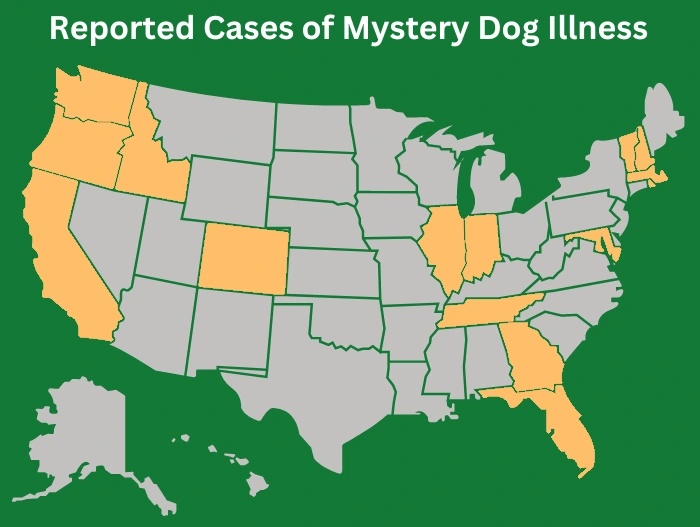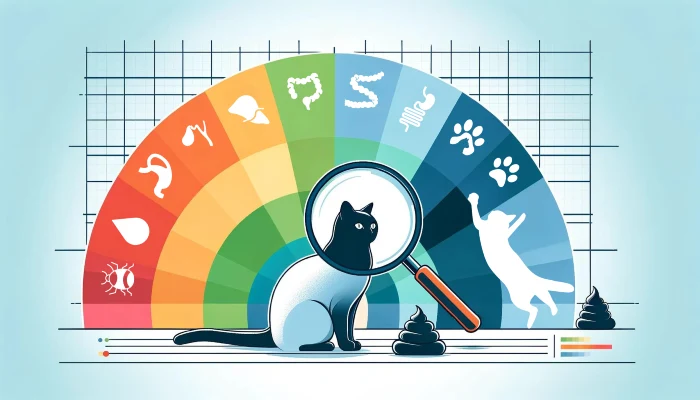Across the United States, veterinarians and pet owners are grappling with a mysterious respiratory illness that has been affecting dogs in numerous states. This emerging health crisis, marked by a range of symptoms from coughs to severe pneumonia and even, in some cases, death, has sparked investigations and concerns in the veterinary community.
How It Spreads & What It Causes
The illness first gained attention earlier this year in Oregon, and since then, cases have been reported in at least 15 states, including Oregon, California, Colorado, Florida, Georgia, Idaho, Illinois, Indiana, Maryland, Massachusetts, New Hampshire, Rhode Island, Tennessee, Vermont and Washington.
The symptoms, predominantly a persistent cough, runny eyes, sneezing, and in some cases, leading to pneumonia and death, have been consistent across reports, indicating a widespread and serious health issue.
What We Know: Research and Discoveries
In a significant development, researchers at the University of New Hampshire’s Veterinary Diagnosis Laboratory, alongside the Hubbard Center for Genome Studies, have identified a potential pathogen responsible for the illness. Through genetic sequencing of samples from infected dogs in New Hampshire, Rhode Island, and Massachusetts, a previously unknown bacterium has been discovered.
Dr. David Needle, pathology section chief at the University of New Hampshire, described the pathogen as “a funky bacterium” – smaller than typical bacteria in both size and genomic scale. This discovery has opened new avenues in understanding and potentially combating the illness.
As of our last update, on December 17, 2023, there is still little known of the cause of the condition. Experts are advising against any form of socialization for your dog at this time including boarding facilities, groomers, doggie daycares, dog parks and any other place that groups of dogs gather until more is known.
Veterinary Experts Speak Out
Veterinary professionals are working diligently to understand this illness.
Dr. Kurt Williams of the Oregon Veterinary Diagnostic Laboratory noted the difficulty dogs face in combating this new illness, which in some instances has led to fatalities. The challenge lies in the bacterium’s ability to potentially evade the canine immune system, making it a formidable pathogen.
Veterinarians are also cautious about the treatment approach. Due to the difficulty in growing the bacteria in lab conditions, traditional methods like testing antibiotics on cultured bacteria have been challenging. However, the structure of the bacteria offers clues, with Dr. Needle suggesting that doxycycline might be an effective treatment.
What’s Been Done & What You Can Do
As the illness continues to affect dogs across the nation, veterinary and public health officials are on high alert. Mike Stepien from the USDA Animal and Plant Health Inspection Service (APHIS) highlighted the agency’s collaboration with state health officials and diagnostic labs to understand and address the illness.
The most recent information has pointed out that some vets have used Chloramphenicol, but not as the first option of treatment due to its toxicity to humans and possible side effects.
Your dog’s vet will choose the best course of treatment for your dog, so don’t hesitate to take your pet in at the first signs of symptoms. Better to be safe than sorry right now!
Given the overlapping symptoms with other respiratory infections like canine influenza and kennel cough, and the absence of a definitive test for this new illness, the exact number of affected dogs remains uncertain. However, the scale of the problem is significant, with hundreds of cases reported in Oregon alone.
In light of the holiday season and the likelihood of increased travel and kennel stays, experts advise caution.
More To Discover
- Can Dogs Drink Oat Milk? Here’s What You Need to Know
- Scientists Finally Decoded The Enigmatic Cat Purr! Dive Deep or Skim the Fun Version – Your Choice
- Dog First Aid: Essential Skills, Techniques, and Kit Every Dog Owner Should Know
- New Pup on the Block: Ultimate Guide To Introducing Your New Puppy To Your Older Resident Dog (Helpful Examples Included)
Dr. Williams and Dr. Karl E. Jandrey recommend avoiding crowded dog facilities and ensuring up-to-date vaccinations for known respiratory diseases. Alternatives like hiring a house sitter or dog walker are suggested to minimize exposure risks.
As research continues to uncover the nature of this illness, the veterinary community remains vigilant. The identification of the new bacterium is a critical step forward, but much remains to be understood. Collaboration among researchers, veterinarians, and public health officials will be key in unraveling the mystery of this illness and safeguarding the health of dogs nationwide.
We’ll keep you updated as more information becomes available.
Please note that Dakoa doesn’t report on unconfirmed cases, research, or data.

























